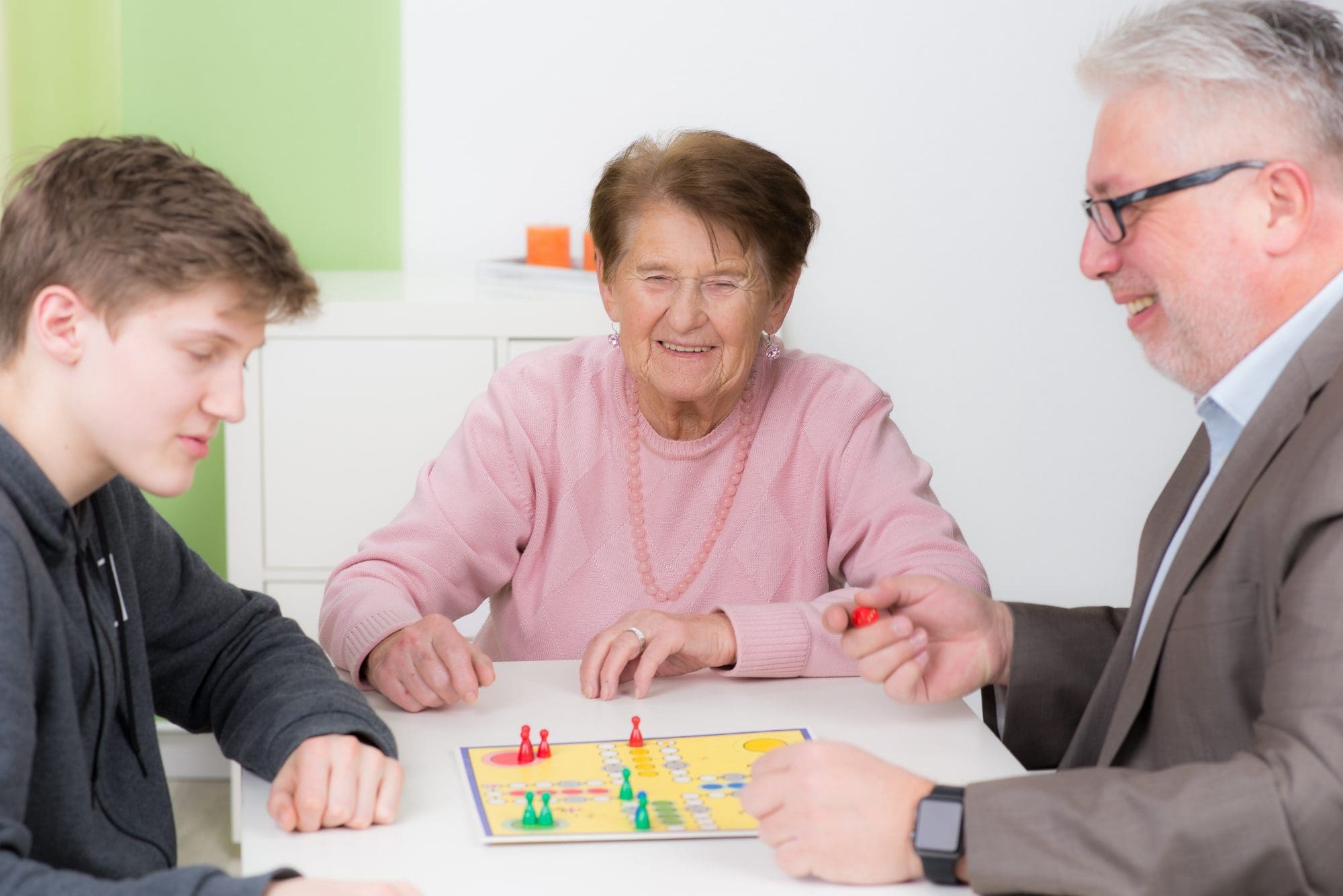“There are three lessons I’ve learned from my grandmother and the dozens of people I’ve come to know living with this disease. Diagnosis doesn’t mean you’re dying tomorrow. Keep living. You won’t lose your emotional memory. You’ll still be able to understand love and joy. You might not remember what I said five minutes ago, but you’ll remember how I made you feel. And you are more than what you can remember.” – Lisa Genova, neuroscientist and author of Still Alice. (Source)

If you’re struggling to connect with your loved one who has Alzheimer’s, there is hope! Here are ten fun ways to connect with, well, anyone, but especially someone with Alzheimer’s disease.
1. Outings
For Alzheimer patients who still enjoy going out, give them a chance to escape from their home or facility for a day. It may be a relief. What did your loved enjoy before the diagnosis? Take an animal lover to the zoo, a history buff to the museum, or someone who just needs a little peace and quiet to a nature park.
Try to pick the time of day when your loved one is at their best and there aren’t as many people. Crowds can be frightening and confusing for someone with Alzheimer’s. If nothing goes according to plan and your loved one does not enjoy an outing as much as you had hoped, there are plenty of in-door things to do together.
2. Art
There are hundreds of fun, imaginative things to do with arts and crafts. Studies have shown that art therapy can cause great improvements in the lives of Alzheimer’s patients. Not only can it give them a sense of meaning and purpose, but it can allow patients struggling with language to express themselves through a medium other than speech. Dormant creativity has been known to appear in people who were not considered artistic in the past.
Place a disposable mat or tablecloth down. Water colors, colored pencils, and oil crayons are some of the few art mediums that can be easily cleaned up. Keep your workspace organized so your loved one knows exactly where everything is. Choose a simple paint by number or picture to copy, but try not to choose anything too childish. Your loved one will appreciate the gesture.
Crafts are fun fine motor skill developers. Paper, stamps, and ribbon can be used for card making. Dictating a letter to a grandchild can make your loved one feel involved in the family and will be a treasured possession for years to come.
Scrapbooking can be great for memory recall. Felt crafts can be used to make ornaments or little toys for the grandchildren. Jewelry might make the list of things to do during social hour (just make sure to use larger beads and thread). If one craft causes frustration, another one might be more enjoyable. Finding the right craft for your loved one can be part of the fun!
Simple adult coloring books is another tool for connection and can provide hours of fun. If you’re not sure how to start a conversation, Color Your Mind, a coloring book specifically for families dealing with Alzheimer’s, can help you get started.
For more information on art therapy and how to implement it, click here.
3. Music
There are amazing studies being done about music and the brain! Not only can old music stir dormant memories and feelings, it can also help with dormant muscle memory and language. Because we use so many parts of our brain to process music, it is able to bypass some other areas affected by Alzheimer’s. Music is a super stimulus for our brain. It is embedded in our movements, our emotions, and our memories. It is an essential part of the healing process for patients with Alzheimer’s. (Source) It is highly recommended by professionals to use music, not just as a bonding experience, but also as a tool to aid the mind.
Use a musical provider that’s free of commercials. These interruptions can be confusing for your loved one. A pair of headphones is essential for blocking out ambient sounds that can make it difficult to focus. Look up old playlists and popular songs from when your loved one was a child, teenager, and young adult. Then sit back and watch her face come alive as she sings and dances to the music. For more information about pursuing music therapy further, click here.
4. Games
Games are the great connector. We use our mind, our motor skills, and our social skills while playing games. We laugh (and sometimes we cry) over a game. If your loved one is up to the challenge, introduce a fun game you can play together consistently. Keep it simple with UNO, Dominos, or Bingo. Try Yahtzee, Scrabble, or Checkers for clearer minds.
Bingo is especially good for connecting pictures to spoken word. PicLink is a game developed specifically for those suffering from dementia and their families or caregivers to play together. PicLink matches pictures of people or objects to specific categories. Another great game is Follow Your Nose. It’s a similar concept to PicLink, but uses smells instead of pictures.
5. Puzzles
Jigsaw puzzles are another great way to spend a rainy afternoon indoors. Puzzles come in 2 dimensions or 3, with anywhere from 2 to thousands of pieces. These “toys” have been around since the 1700’s. They may be categorized as a game, but puzzles can help with fine motor skills and provide a quiet way to spend time together. Many puzzles are quite beautiful when completed. They can be matted and framed or taken apart to be put back together again and again.
Try to choose one with a skill level that won’t frustrate your loved one. Don’t be too ambitious. It’s the time spent together that counts, not the number of pieces. If you want to double up on the motor skills and picture recognition, some photo printing places offer to make jigsaw puzzles out of photographs. This can be a good way to jog memories and create new ones.
6. Food
A whiff of warm cinnamon, the sweet scent of herbal tea sending curls of steam from a mug—smells can trigger memories that sometimes words and pictures cannot. Bring your loved one a favorite childhood treat or a cup of tea. Not only can it evoke old memories, it will create new memories for both of you. Another fun way to engage your loved one with food, especially during the holidays, is through cookie or cupcake decorating.
Make sure everything is prepared beforehand. Put down a disposable tablecloth or placemat to catch the mess. Again, have everything organized so it’s easy to find. If you’re going to do icing, make sure everything is prepared beforehand. Pre made bags of icing are easier for loved ones and caregivers. Don’t expect perfection, but do expect to have fun!
7. Old Movies and TV Shows
Are you tired and overworked, but want to spend time with your loved one? Old movie dates are great for those times when you are low on energy. Alzheimer sufferers still enjoy movies they enjoyed as young adults and seem to respond especially well to musicals. If you need a quick list to get you started, Singin’ In The Rain, The Sound of Music, Meet Me In St. Louis, and Seven Brides for Seven Brothers are all great options.
If your loved one is more of a television fan, Roy Rogers The Big Valley, Million Dollar Man, The Andy Griffith Show, and many more programs are also good options. These can be good for when you feel strapped on time, but still want to spend a quick hour or two together.
8. Old Radio Programs
Many years ago, families gathered around the radio to listen to their favorite programs. Not only can some Alzheimer patients recall the punchlines to some of their favorite on air jokes, their emotional memory has recorded the warmth and togetherness of those family evenings. Shows like Gunsmoke, Jack Benny, or CBS Radio Mystery Theater are all good options and can be found online for free here or to purchase here.
9. Reading
Studies have shown that those who read are less likely to develop dementia. Reading is not just entertainment! Not only is it good for those showing early stages of Alzheimer’s, it’s good for healthy brains too! If your loved one struggles with eyesight or reading, see if they would enjoy being read aloud to. A book they enjoyed before their diagnosis may help with memory retention as well.
If reading aloud isn’t really something you are comfortable with, there are many books on tape. Use headphones instead of earphones to block out sound. Concentration is something your loved one has trouble with and headphones help them focus.
10. Exercise
If your loved one is restless at night, it may be time to take a little walk around the yard. Exercise is one of those things that can positively affect all areas of life. Decide on the right form of exercise for your loved one. Keep in mind their mental acuity, skill level, and what they enjoyed doing before the diagnosis. Light gardening, or a quick walk may be enough to exhaust one person. Others may require something more challenging like a long walk at your local park or dancing to a favorite old melody. Check to see if there are yoga, aquatics, or other exercise classes for the elderly in your area. Some places even offer exercise programs specifically for those with dementia.
Slow Down
There are some things to keep in mind when spending time with your loved one who has Alzheimer’s. Slow down. Don’t talk too fast or expect a quick answer. Give time to process and respond. Speak clearly, simply, and calmly. Use their name, make eye contact, and make sure you have their attention before speaking.
Try to make social time a routine-even if you are only able to do it once a week or even once a month. If you are a care giver, remind them that social time is coming up. If you are their primary care giver, ask their care giver to remind them. This will give them something to look forward to. Try to choose an area free of distractions, turn off TV or radio, mute phone, etc.
Break down what you are going to do in small, manageable steps. If they’re struggling to remember a step in the process or even a word or phrase, it’s OK to help them out. Don’t correct them like a child, but help them like you would want someone else to help you if a word was “on the tip of your tongue”.
Just like anyone suffering from a chronic disease, Alzheimer patients have good days and bad days. If the activity becomes overwhelming, it’s OK to stop and start over some other time. Keep trying! “They might not remember what you said five minutes ago, but they’ll remember how you made them feel.”
At Home Care provides expert care and compassionate companionship for your senior loved ones. Request a free consultation today to get started.


